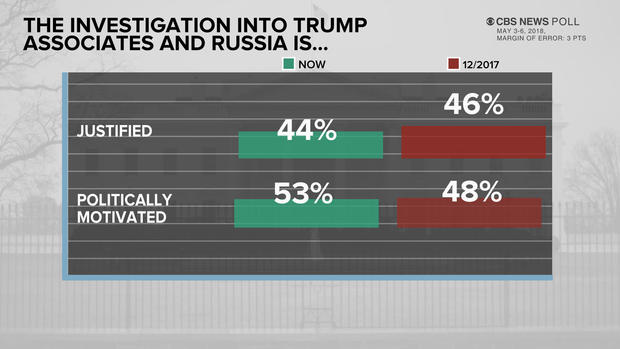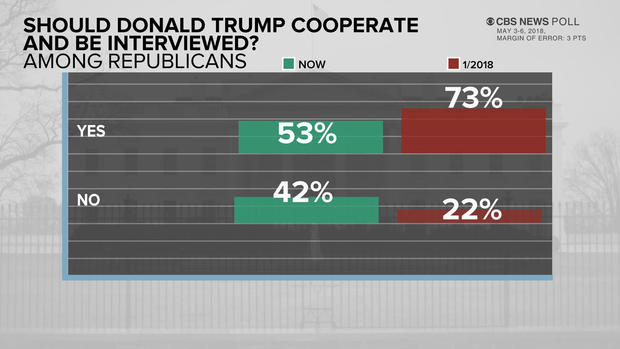More Americans now say Russia investigation is politically motivated – CBS News poll
By Jennifer De Pinto, Fred Backus, Kabir Khanna and Anthony Salvanto
A year into the special counsel investigation into Russian involvement in the 2016 elections, a slight majority of Americans thinks the investigation is politically motivated. Fifty-three percent say so, while 44 percent think the investigation is justified.
Nevertheless, three in four Americans still think President Trump should cooperate if he is asked to be interviewed as part of the Russia investigation, though this is a smaller proportion than thought so at the beginning of the year. In January, 84 percent said that Mr. Trump should cooperate, now 76 percent do.
The shift reveals a hardening stance among Republicans, who are now even more critical of the investigation. While a large majority of Republicans has always seen the investigation as politically motivated, the percentage that thinks so has risen seven points since December. There is an even larger shift when it comes to whether Republicans think Mr. Trump should cooperate with the special counsel. In January, 73 percent said he should cooperate, but now just 53 percent do.
Most Americans also think the Russia investigation should continue, but Republicans think that their party in Congress should take steps to end the Russia investigation. Most independents and nearly all Democrats think the Republicans in Congress should let the investigation continue.
This poll was conducted by telephone May 3-6, 2018 among a random sample of 1,101 adults nationwide. Data collection was conducted on behalf of CBS News by SSRS of Glen Mills, Pa. Phone numbers were dialed from samples of both standard land-line and cellphones.
The poll employed a random digit dial methodology. For the landline sample, a respondent was randomly selected from all adults in the household. For the cellphone sample, interviews were conducted with the person who answered the phone.
Interviews were conducted in English and Spanish using live interviewers. The data have been weighted to reflect U.S. Census figures on demographic variables.
The error due to sampling for results based on the entire sample could be plus or minus three percentage points. The error for subgroups may be higher and is available by request. The margin of error includes the effects of standard weighting procedures which enlarge sampling error slightly.
This poll release conforms to the Standards of Disclosure of the National Council on Public Polls.







